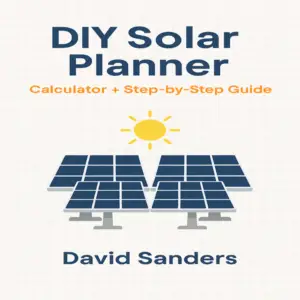As an Amazon Associate, this site earns commissions from qualifying purchases. For more details, click here.
Thinking about putting solar panels on your roof? You’re not alone. More and more homeowners are turning to solar to cut energy bills, boost home value, and reduce their carbon footprint.
But one big question often comes up before making the leap:
“Should I wait for solar panel prices to go down?”
The answer isn’t black-and-white. While prices have dropped a lot over the past decade, they’ve hit a bit of a plateau in recent years. And for homeowners, the bigger picture isn’t just about panel prices—it’s about overall value and timing.
Let’s dig in.
Ready to size your solar system the smart way?
Get the DIY Solar Planner — includes a powerful sizing calculator and a step-by-step guide to plan your solar panel system with confidence. You also get wiring diagrams for solar panels, inverters, batteries and much, much more.

🔙 A Quick History of Solar Prices
Over the last 10–15 years, solar energy has gone from niche to mainstream. With that, the price of solar panels has fallen dramatically—more than 70% since 2010.
What caused the drop?
- Technological improvements (more efficient panels)
- Global production (especially from China and Southeast Asia)
- Better installation methods and economies of scale
But since 2020, things have been a little different. While costs are still relatively low, prices have flattened due to global supply chain issues, tariffs on imported parts, and higher costs for raw materials like silicon and copper.
📉 Will Solar Prices Drop Further?
Probably—but slowly.
While it’s unlikely that we’ll see the dramatic price drops of the past decade, experts believe solar prices will gradually decline thanks to:
- New panel technology (like perovskite and bifacial panels)
- Automation in manufacturing
- Expanded production capacity in key markets
That said, the savings from waiting a year or two might be minimal—maybe a few hundred dollars on an average system. Meanwhile, you’re missing out on monthly utility savings while you wait.
⏰ Is Now the Right Time for You to Go Solar?
Here’s a key truth many homeowners overlook: timing solar around price drops isn’t as important as maximizing incentives and savings.
✅ Reasons why now can still be the best time:
- 30% Federal Solar Tax Credit (U.S.) is still in place
- Some state and local incentives are first-come, first-served or set to expire
- Utility rates keep going up, making your current energy bill more expensive every year
- Solar financing is available with low-to-no upfront costs
- The longer you wait, the longer you’re not saving on electricity
📊 How to Compare Solar Quotes Like a Pro
Not all solar quotes are created equal. Even if two companies offer the same system size, the final price and savings can vary dramatically.
Here’s what to look for when comparing quotes:
1. System Size & Panel Type
- Measured in kilowatts (kW) – a typical home system ranges from 4 to 10 kW
- Ask what brand and model of panels they’re using—some are more efficient and last longer
2. Total Cost vs. Cost per Watt
- Total cost = the full installation price before incentives
- Cost per watt = total cost ÷ system size in watts (this lets you compare apples-to-apples)
A good benchmark is $2.50–$3.50 per watt, but this can vary by location.
3. Incentives and Tax Credits
- Make sure the quote includes estimated savings from:
- Federal solar tax credit
- State rebates or local programs
- Net metering or energy buyback rates
4. Warranties
- Look for at least:
- 25 years on panels
- 10–25 years on inverter
- 10+ years on workmanship
5. Energy Offset
- Ask: “How much of my electric bill will this system cover?”
- A good installer will show you estimated savings year over year
6. Financing Options
- Cash isn’t the only option. Ask about:
- $0-down solar loans
- Power Purchase Agreements (PPAs)
- Solar leases
Each has pros and cons, so get a breakdown.
🔍 Red Flags to Watch Out For
- Pushy sales tactics or high-pressure phone calls
- Quotes that seem too good to be true
- Vague system specs without panel or inverter models listed
- No on-site evaluation before giving a final price
A trustworthy installer will be transparent, walk you through options, and tailor the system to your home’s needs.
💡 Final Thoughts for Homeowners
Yes, solar panel prices may go down a bit more over time—but the amount you might save by waiting a year or two could be less than what you’d save by going solar today.
The better question might be:
“When does it make sense for me to go solar?”
If your home gets good sun, your electric bills are rising, and you can take advantage of tax credits, then now could be the right time to make the switch.
✅ Next Steps
- Get at least 2–3 quotes from reputable local installers
- Use tools like EnergySage or SolarReviews to compare
- Check if your state or utility offers special programs or rebates
- Run the numbers: look at your payback period and total lifetime savings

I am an advocate of solar power. Through portablesolarexpert.com I want to share with all of you what I have learned and cotinue to learn about renewable energy.
